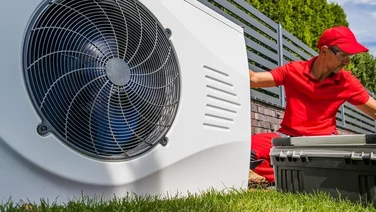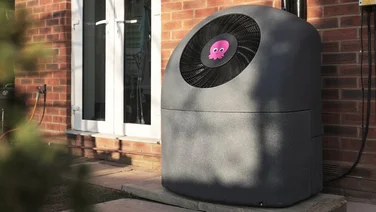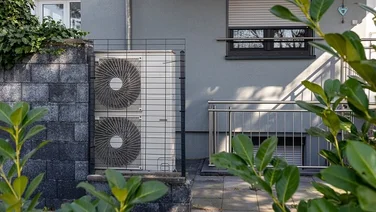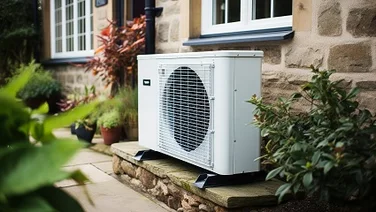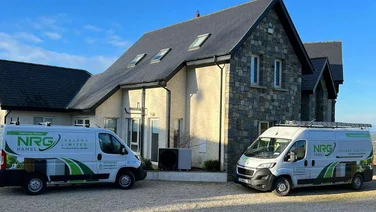- Our experts researched more than 100 of the UK’s accredited heat pump installation companies
- We rated the best seven firms against 10 key criteria
- Criteria included product quality, guarantees and reviews from real customers
- Read our guide before choosing the best heat pump installer for your home

A heat pump is a low-carbon way to heat your home and hot water – and it could save you a packet in energy bills.
The Energy Saving Trust calculates that switching from a conventional boiler to a heat pump could reduce your heating bills by £340 a year. No wonder air source heat pumps are booming. UK heat pump installations passed the 250,000 mark in August 2024, a 45% increase on the previous year.
A government grant under the Boiler Upgrade Scheme (BUS) will cover up to £7,500 of the cost, but that still leaves you with a chunky upfront bill. Octopus Energy says it can install a heat pump for as little as £500 after the grant is subtracted, but the MCS says the average UK heat pump installation costs £12,600.
To help you spend your money wisely, we’ve compiled this guide to the UK’s best heat pump installers.
Our researchers spent more than 20 hours scrutinising 102 MCS-certified installers on criteria, including: guarantees, experience, financing and customer feedback. We reveal our top seven below.
For more information on how we selected companies for our rundown, skip down the page to our methodology.
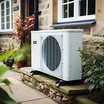
At a glance: the UK’s best heat pump installers
Take a look at our quick comparison table to see the best air source heat pump (ASHP) installers, the areas they cover, and the guarantees they offer:
| Heat pump installer | Area covered | Launched in UK | Guarantee |
|---|---|---|---|
| Octopus Energy | Most of England and Wales | 2015 | 8 years |
| Aira Home | England and Scotland | 2022 | 15 years |
| Warma UK | Most of mainland Britain | 2016 | 7 years |
| Puraflow Renewables | UK | 2022 | Manufacturers’ warranties |
| Renewafuel | Mainland Britain | 2018 | 10 years |
| Adlar Castra | London and the South East | 2024 | 2-5 years |
| ELT Heat | London and the South East | 2023 | 5-7 years |
Best value for money: Octopus Energy

Octopus Energy is best known as an energy supplier with a leggy pink mascot, but its tentacles reach further than you may think. It now installs air source heat pumps, and even makes its own ASHP model. You can hire it for your heat pump installation whether or not it provides your gas and electricity.
This London-based firm only entered the market 10 years ago, but it’s already the UK’s biggest energy supplier. It now offers a whole range of renewables including solar panels and EV chargers as well as heat pumps.
In 2024, Octopus has even launched its own heat pump: the Cosy 6 (pictured above). It also installs models from leading brand Daikin. Both work well with the company’s ‘Cosy Octopus’ smart tariff, which aims to keep your outgoings as low as possible.
Octopus works to keep heat pump prices competitive, too. It’s unlikely you’ll pay as little as the £500 Octopus claims it can install an ASHP for, but prices are at the low end of the market. Like all the installers on our list, Octopus will help you claim the maximum £7,500 government grant for your heat pump. It also runs the £30 million Octo Assist hardship fund to help customers on low incomes.
Customer feedback for Octopus Energy is frankly ecstatic. You’d expect some grumbling in reviews for a company this size, but not so with Octopus. Its 4.8 Trustpilot score is consistent and outstanding. Five-star reviews are posted most days and praise efficient heat pump installations, phenomenal aftercare and excellent value for money.
Luis, an Octopus Energy customer, said: The installation was fantastic. The team was very professional and made the process as smooth as possible. They were clear about what to expect and double-checked everything before starting.”
Eleri, another customer who also had the Cosy heat pump installed, said: “It was fantastic. The communication was great, and everything went smoothly. We couldn’t fault the process at all.”
One change we’d like to see from Octopus is wider availability. It currently installs heat pumps “across most of England and Wales”. However, following a partnership with the National Grid to build a network of verified installers across the UK, coverage is likely to grow fast.
- Outstanding customer feedback for heat pump installations and competitive pricing
- Heat pumps and installation offer excellent value for money – as does the Cosy Octopus tariff
- Makes its own Cosy heat pump range and installs market-leading Daikin models, so you have plenty of options
- Committed to green energy through partnerships with bodies such as the Centre for Net Zero
- Doesn't cover the whole of the UK, but is working to expand its reach
- 8 year warranty is better than some, but far short of Aira's 15 years
What Octopus Energy’s heat pump customers say:
“Outstanding service! When you email a utility company at 19:30 on a Sunday with a non-urgent request you generally expect it to be picked up some time on Monday. Not with Octopus! Thabo K went above and beyond to help me out. Quite simply: this is the reason my energy, car charger, and pending heat pump are all from Octopus.” – Tom, February 2025
“Very professional, supportive and considerate team for an air source heat pump installation. We have had zero issues with the heat pump (Octopus’ own ‘Cosy 6’ model). The team was clear on how and who to contact should anything happen.” – Daniel, February 2025
Best for warranty: Aira Home

Swedish heat pump maker and installer Aira Home boasts the best guarantees and financing options in our roundup. It has teamed up with industry partners to offer solar panels, insulation and other services across most of the UK. Not bad for a firm that only launched on these shores in November 2023.
Aira’s installers are fully-qualified employees who only install one brand of heat pump: Aira’s own. The Aira Heat Pump is one of the most efficient ASHPs you can buy, and we named it “best all round” in our best air source heat pumps article. Aira guarantees its system will keep your home at a comfortable 18-22°C all year for 15 years, beating its closest rival by five years.
The firm’s subscription-style finance plan is unique in the heat pumps industry. After the £7,500 BUS grant is subtracted, you have around £4,000-£7,000 to pay for the Aira Heat Pump and installation. To help, Aira lets you spread the cost via monthly payments. The scheme has been described as “Spotify for heat pumps”, but it’s not quite that simple: you still have to apply and have your credit approved.
Aira recently invested £300 million in its UK growth plans, and CEO Martin Lewerth aims to see the firm’s heat pump in 1 million UK households within a decade. That’s quite some ambition – but given Aira’s rapid growth so far, they may just achieve it.
Read our in-depth Aira review for more.
- The Aira Heat Pump is outstanding, with excellent efficiency and cold weather ratings
- 15-year product and performance guarantee beats all competitors by years
- Customers praise excellent workmanship and heat pump systems
- Subscription-style financing plan lets you spread the cost
- Doesn't install other brands of heat pump, so price options are limited
- Some customer reviews mention a lack of communication. This may be because the company is so new to the UK market
What Aira Home’s customers say:
“This is an easy 5 star review. We had various quotes before deciding to go with Aira. The product is by far the best that we could find on the market. The journey with them was flawless. Our only sticking point was the applying for the grant funding which is obviously (beyond) Aira’s control, but they did offer us assistance.” – Margaret, September 2024
“The Aira quote was the cheapest by about £1k. Has the added benefit of 0% spread over 12 months. You don’t pay anything until installation is complete and you are happy with the install”. – Jeremy Harris, June 2024
Best for grants: Warma UK

All reputable heat pump installers offer advice on government grants including the £7,500 BUS payment, but few are as proactive about it as Warma. “Who qualifies for free heating grants?” is even the first item under Heating on its website.
Cheshire-based Warma, which installs Samsung EHS (Eco Heating System) Monobloc heat pumps across most of mainland Britain, is renowned for excellent customer service. But what impressed us most about this friendly company was its determination to win all available subsidies for customers.
Like many nationwide installers, Warma has grown into a one-stop shop for sustainable energy. Solar panels, solar batteries, insulation and home EV charging are among the services it provides. The company features in our roundup of the UK’s best solar panel installers, and we will soon explore its full range of services in our in-depth Warma UK review.
Customers report being pleasantly surprised that Warma’s teams could carry out multiple installations so quickly. Warma also receives excellent feedback for its customer service and system quality. Given how much grant-funded work Warma carries out, we were surprised there weren’t more complains about delays caused by grant applications. A safe and warm pair of hands.
Read our in-depth Warma UK review for more.
- Works proactively to get you any available grants, potentially saving you thousands
- Also installs insulation, solar panels and other sustainable energy measures
- Customers praise workmanship and service, including aftercare
- We'd love to see more easily-accessible information about the Samsung ASHPs Warma installs – it's currently hidden away on a PDF
What Warma UK’s customers say:
“A complete change of heating system is major upheaval in anyone’s home, and it’s the sort of thing that would make anyone nervous to commit to it. But Warma UK made it the easiest and most pleasant experience I could have wished for. I can’t recommend them highly enough” – Rayna Tullett, October 2024
“My mum has just had a new heat pump, solar panels and loft insulation installed, all fully funded by the Eco grant scheme. Warma carried out the work and she couldn’t be happier with the experience. The engineers were friendly and professional, and went above and beyond” – Kelly, October 2023
Best for customer service: Puraflow Renewables

Puraflow says it has more than 10 years’ experience in the renewables sector, but the company is fairly new to the scene. It set up shop in Nottinghamshire in 2022, and has fewer than 100 customer reviews on Trustpilot. But in a reassuring case of quality over quantity, the reviews are among the best we’ve seen for any company.
Customers express delight at clear quotes, fast installation, tidy work and friendly but professional customer service. The single 1-star review was from a customer who never heard back after the initial home visit, and the Puraflow team replied offering to “get to the bottom” of what happened. That suggests a commitment to keeping customers happy.
Puraflow’s website is polished and professional, with sections for solar PV and battery storage as well as for ASHPs. The company also provides home insulation services. There’s a good selection of heat pumps on offer, with Samsung, Mitsubishi and Vaillant models all installed by the fully-accredited team. You can apply for financing through the site, too.
- Superb customer feedback, with a 4.7 Trustpilot rating
- Customers glow with praise for the team's friendly but professional approach
- Good choice of heat pumps from top brands Samsung, Mitsubishi and Vaillant
- Also installs solar panels, batteries and home insulation
- For solar installations, Puraflow exclusively provides REA Fusion solar panels, which may not be the ones you want
What Puraflow Renewables’ customers say:
“Brilliant, brilliant, brilliant. Lovely team. Super friendly, quick to respond, and really went out of their way to help me out with questions about what would happen and when. Everything was sorted in no time, and made the whole process simple and hassle free” – Anna Walker, September 2024
Best for national coverage: Renewafuel

Renewafuel offers a broad range of products and services, including solar panel and EV charger installations as well as ASHPs. It also covers a much wider geographical area than its younger competitors.
That may put you off if you’re looking for a heat pump specialist or a company that focuses on your area. However you feel you’re in good hands with Renewafuel, which has been trading for nearly seven years.
The company only installs Mitsubishi Ecodan domestic heat pumps, but these have been carefully chosen to offer high efficiency and quiet operation. Renewafuel offers a 10-year performance guarantee to ensure that its ASHPs heat your home comfortably for at least a decade.
You can also be confident that you will be handled professionally and courteously, judging by Renewafuel’s customer feedback. Its 4.4 Trustpilot rating is deemed “excellent”, with customers giving high praise for its speed of service, aftercare and system performance, although there are a few grumbles about no-shows.
- Covers all of mainland Britain, so they're very likely to serve your home
- Excellent customer feedback praises fast response and professional approach
- Customers say the system is easy to use and fast to heat up
- Has been installing heat pumps in the UK longer than many competitors
- Negative reviews are rare, and Renewafuel replies in detail to all complaints
- Only installs Mitsubishi Ecodan heat pumps, which may not be your first choice
- Wide geographical coverage can have disadvantages such as slower times between quoting and installing
What Renewafuel’s customers say:
“Our property came with many challenges to design and installation which they overcame without compromising on quality. The installation team were friendly and tidy. They completed the whole installation in only 2 days” – Pete Watson, August 2024
Best for hard water areas: Adlar Castra

Like our number one choice Aira, Dutch firm Adlar Castra is new to the UK and only installs its own brand of heat pump. Unlike Aira, it currently only serves London and the South East.
That regional limitation will exclude many potential customers, but stay tuned if you’re one of the many UK residents who struggle with hard water and limescale. Adlar’s ASHP could solve that problem and make your home’s heating and hot water far more efficient.
Adlar’s product is a dual heat pump system, with an outdoor unit for heating and an indoor cylinder unit for hot water. The indoor cylinder balances its water’s pH by removing calcium and other mineral deposits that create limescale. The unit also supports smart connection to solar batteries, so you can run yours as a “thermal battery” which stores heat energy.
Adlar is so new to these shores that it doesn’t have any English-language reviews on Trustpilot yet, so we worked a bit of magic with Google Translate. Dutch customers have some complaints about the wait between booking and installing, but they seem happy with service and delighted with their Adlar systems.
- Adlar's dual heat pump system lets you manage your heating and hot water separately
- The system's indoor cylinder softens your hot water as well as storing it
- Two-year product warranty and five-year workmanship guarantee offer reassurance
- Currently only covers London and the South East, but plans to expand
- No English-language Trustpilot reviews yet
- Doesn't provide or install ASHPs other than its own
- Doesn't offer other renewables such as solar
What Adlar Castra’s customers say:
“Good and clear communication in the preliminary phase. Home visit was enlightening, and good advice was received. A 6kW Adlar Castra Il was installed within four weeks of request. When you wake up in the morning, the living room and kitchen are comfortably warm. Temperature continuously 21 degrees” (translated from Dutch) – Harry Bald, September 2024
Best newcomer: ELT Heat

St Albans-based ELT Heat is something of an enigma because there are no customer reviews online. Its website is initially confusing, too, because it bears the name of its parent company Emerging Living Technologies. However, the site is full of information, and ELT Heat was one of the fastest responders to our enquiries.
The company provides and installs two major heat pump brands, Samsung and Vaillant, including the Vaillant aroTHERM model that was our choice as “most future-proof heat pump” in our rundown of the best air source heat pumps.
All ELT Heat’s engineers are full-time employees, and lead engineers are Level 3 heat pump qualified. “All the engineers and apprentices are doing heat pump installations all day every day,” company director Michael Dominguez told us, “So we are developing a deep and robust skill base.”
The company only covers London and the South East at present. Dominguez told us he’s hoping to expand once the quality of its service can be replicated at a national scale. Similarly, ELT doesn’t currently offer financing, but this may change in the future.
- All ELT's engineers are full-time employees, so you won't have your ASHP installed by a subcontractor
- Approved installer of industry leading Samsung and Vaillant heat pumps
- Offers product guarantees of five years (Vaillant) and seven years (Samsung)
- Responded quickly and graciously to our enquiries, which shows a commitment to customer relations
- Currently only covers London and the South East but hopes to expand
- No customer reviews online yet, and we'd be reluctant to hire an installer without knowing what customers say.
Our methodology explained
Here are the 10 key criteria we used when narrowing down to our seven top installers:
- Accreditation: All the companies we considered including are certified by renewables standards body, the Microgeneration Certification Scheme (MCS). We also prioritised firms accredited by the Renewable Energy Consumer Code (RECC), NAPIT and TrustMark.
- Product quality: Some firms produce their own heat pumps, while the others are accredited installers for top heat pumps including Vaillant and Samsung.
- Guarantees: The best installers include workmanship and “comfort” guarantees as well as product warranties.
- Customer feedback: We analysed more than 1,000 verified customer reviews via Trustpilot and Checkatrade. We prioritised companies with a high proportion of positive reviews.
- Customer service: We gave companies credit for responding quickly and graciously to feedback, and for offering easy ways to get in touch.
- Industry experience: The heat pumps industry is still young, so you won’t find companies with 50 years’ experience like you would with double glazing. But if a firm has spent years installing heating, you can be fairly sure it knows its stuff.
- Range of services: Many heat pump installers also offer solar panels and battery installation. It’s worth forming a relationship with them if you plan a switch to other sources of green energy.
- Value for money: We didn’t just look for the cheapest quotes overall, but considered a balance of cost, quality and transparency about pricing.
- Finance options: We looked for companies offering easy, flexible repayments through reputable financing partners.
- Geographical coverage: The best installers cover a wide area, but we recommend considering local firms too. Use our free heat pump installation quote tool to find installers near you.

Next steps
By now, you’ll have a good idea of which type of heat pump is right for you. You may even know which company you want to install it. Your next step is to find the best deal available to you – and that’s where we come in.
Enter a few details about your home on our heat pump quotes form and let us do the rest. We’ll pass on your details to our hand-picked selection of professional installers. They’ll get in touch to let you know their best prices. You’re under no obligation to take them up on it.
If you’d like to know a bit more about how much a heat pump system and installation might cost you, check out our guide to heat pump costs.


